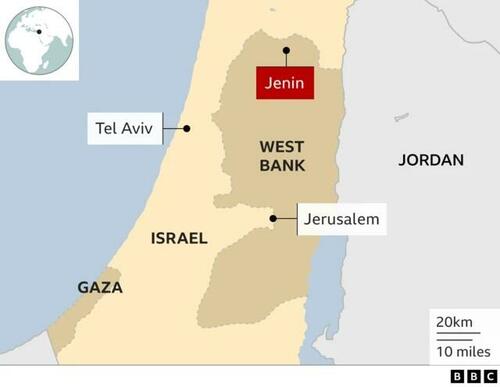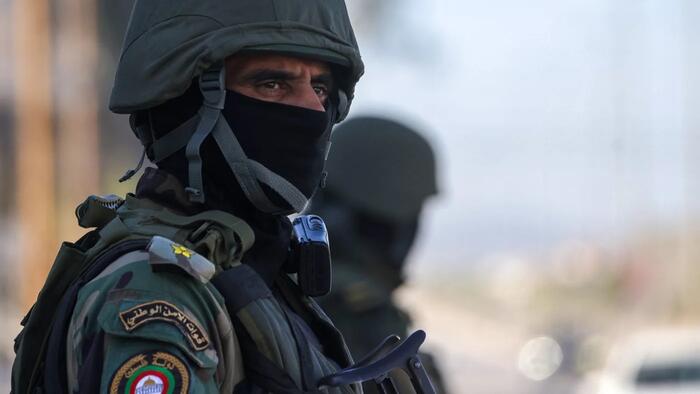Via Middle East Eye
The Palestinian Authority (PA) asked the United States to approve a four-year $680m plan to boost the training of its special forces and bolster its supply of ammunition and armoured vehicles, an American source and a source close to PA revealed to Middle East Eye.
The request was made in mid-December at a meeting with US security officials at the PA’s Ministry of Interior in Ramallah in the occupied West Bank. At the meeting, PA security officials expressed frustration over what they believed was the US’s failure to fulfil its commitments to the authority by replenishing arms supplies and training special forces.
“Authority officials requested in the meeting that their needs for armored vehicles and ammunition be met urgently in light of the difficulty of the clashes and their inability to resolve the situation in the Jenin camp,” a source told MEE.
They also complained that the US had yet to approve funding for renovation works at prisons in Bethlehem and Nablus in the occupied West Bank.
The meeting came as the PA launched a crackdown on Palestinian fighters belonging to Hamas and Palestinian Islamic Jihad in Jenin. Fighting in the northern West Bank city, long a bastion of Palestinian resistance, has killed at least eight people, according to local media reports.
One former US intelligence official told MEE that the PA’s request for additional funding and arms made sense because the US has been pressing the PA for months to ramp up security operations in the occupied West Bank. The PA has been critical of the departing Biden administration’s post-war planning for the destroyed Gaza Strip.
Since the summer, the US has tried to bolster coordination with the PA. A think tank panel staffed by former US officials even presented a plan to bring cooperation with the PA’s security forces under the purview of Centcom, MEE reported previously.
‘Not a happy relationship’
According to Israeli media reports, the US Security Coordinator (USSC) for Israel and the Palestinian Authority, General Michael Fenzel, met with PA officials and reviewed their planning for the raid on Jenin.
The US has provided security assistance to the PA since the 1990s. After the Second Intifada, it established the USSC to train its security forces. While the Jerusalem office is tied to the US State Department, American intelligence agencies and the Defence Department have the most regular contact with the PA’s forces.
“It’s not a happy relationship,” William Usher, a former CIA officer who was based in Israel, told MEE previously. “And has little depth. It’s been reduced at heart to a security relationship.”
Complicating the PA’s request for US weapons, Israel can veto security assistance to the authority. According to Axios, the US asked Israel to approve the aid package in December. The previous Trump administration downgraded ties to the PA and former US security officials expressed doubts the US president would press Israel to approve the aid when he returns to office in late January.
Fatah-Hamas rift
The PA was borne out of the Oslo peace talks in the early 1990s. Its leadership comes from the Palestinian Liberation Organization, which waged a decades-long violent struggle against Israel. In return for limited self-governance in the occupied West Bank and Gaza, the PLO recognised Israel’s right to exist and renounced armed resistance.
The PA is dominated by the secular Palestinian party, Fatah. In 2007, fighting broke out between Fatah and Islamist Hamas after the latter swept to power in Palestinian legislative elections the year before. In the end, Hamas consolidated its hold over Gaza and Fatah in the occupied West Bank. Efforts to reconcile the two have failed.

The PA is largely seen as ineffective, corrupt and an Israeli collaborator among Palestinians in the occupied West Bank. After the PA renounced armed resistance to Israel, it was unable to deliver a political solution and an independent Palestinian state, while Illegal settlements in the occupied West Bank and occupied East Jerusalem have soared.
When the Oslo Accords were signed, roughly 250,000 settlers lived in the occupied West Bank. That number has risen to almost 700,000 today, including in the occupied East Jerusalem, which many envision as the capital of a future Palestinian state.
Israel regularly conducts unilateral raids in the occupied West Bank, including in Area A, which was set up to be strictly under the PA’s control. Israel has built a sprawling system of barriers and a network of checkpoints that Palestinians must pass through in their daily lives, obliterating any semblance of freedom of movement in the territory nominal under the PA’s control.
Loading…
Read the full article here
